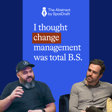
Ep 43: Why Foreign-Trained Lawyers are Essential: Flavia Naves, Of Counsel, Hathaway & Kunz, LLP
If you're a foreign-trained lawyer who wants to move to the U.S., how do you find a job? Why should companies look to foreign-trained lawyers in an increasingly globalized world? And how should you navigate moments of big career transitions?
Flavia Naves, former general counsel at Circle, relocated to the United States after studying law in her native country of Brazil, and went on to become an authority on law and regulation related to crypto, fintech, digital payments, and much more. In addition to her long lost of leading legal roles, she is also a board member, of counsel at Kunz and Hathaway, and commissioner of the State of Wyoming’s Stable Token Commission.
Listen as Flavia shares the challenges she faced as a foreign-trained lawyer, why she advocates for mentorship and specialized training, what it’s like facing unexpected career transitions, and how she came to realize that her biggest differences are her biggest strengths.
Read detailed summary: https://www.spotdraft.com/podcast/episode-43
Topics:
Introduction: 0:00
Moving to the United States after growing up and studying law in Brazil: 2:44
Entering the legal job market as a foreign-trained attorney: 3:51
Seeking mentorship from other foreign-trained lawyers: 8:18
Why companies should consider more foreign-trained attorneys: 11:23
Considering LLMs: 14:36
Navigating moments of career transition: 18:24
Deciding to leave your GC role at Circle: 20:36
Life after Circle: 25:38
Book recommendations: 31:15
What you wish you’d known as a young lawyer: 32:42
Connect with us:
Flavia Naves - https://www.linkedin.com/in/fnaves
Tyler Finn - https://www.linkedin.com/in/tylerhfinn
SpotDraft - https://www.linkedin.com/company/spotdraft
SpotDraft is a leading CLM platform that solves your end-to-end contract management issues. Visit https://www.spotdraft.com to learn more.



















